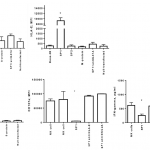NK cells play an important role in viral infections. The University of Ferrari group proposes a treatment using anti-NKG2A antibodies based on the results of research on how NK cells behave in the case of a new coronavirus (SARS-CoV-2) infection.
https://pubmed.ncbi.nlm.nih.gov/32859121/
Infecting S protein of the new coronavirus (Spike 1 Protein and Spike 2 Protein) into lung epithelial cells and co-culturing with NK cells, they investigated the expression status of GATA3 (transcription factor), HLA-E (E class of human leukocyte antigen), NKG2A/CD94 (NK cell inhibitory receptor), CD107a (degranulation: release of cytotoxic factor), and IFN-gamma. As a result, it was found that the following expression changes occurred.
- GATA3’s Advances
- HLA-E’s Advance
- NKG2A/CD94’s Advance
- Decrease in CD107a
- Decrease in IFN-gamma
These changes are caused by SP1 (Spike 1 Protein) of the S protein. Sp1 infection activates the transcription factor GATA3 and presents the SP1 peptide (8mer) on the cell surface by HLA-E. The combined HLA-E and NKG2A/CD94 results in inhibitory signals in NK cells. At the same time, the release of cytotoxic factors has been suppressed, the release of IFN-gamma has been also suppressed, and thereby the immune system of virus elimination has been weakened.
Therefore, in conclusion, in the early stages of infection, it was proposed as a potentially effective treatment to dose anti-NKG2A antibody (monalizumab) in order to enhance immune activity.

